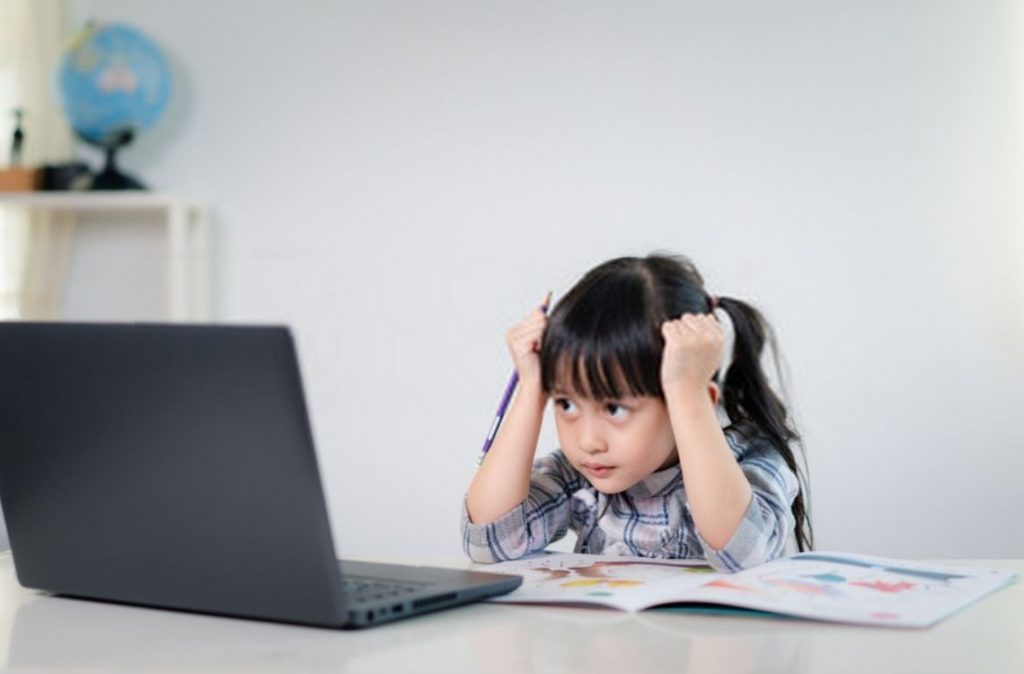Online classes can be overwhelming and stressful for your children. They are used to seeing their friends and learning at school every day.
Now, the CMCO is being extended until December and online learning can be a challenge for every child to adapt. Do you know children can develop stress too? Many parents don’t believe so!
As a responsible parent, you should know what to do to help your children in coping with their online classes. Online classes can be difficult for children because they lack human interaction via face to face.
Depending on their age, individual personalities, and coping skills, children react differently to stress, which may lead many parents to ignore the underlying conditions that could cause the actions of their child.
However, how do you recognize that your child is under stress?
Signs That May Appear When Your Children Are Stressed
According to Everyday Wellness, there are emotional and physical signs that may show up:
Emotional Signs
- Behavioural changes, such as moodiness, aggression, a short temper, or clinginess.
- Development of a nervous habit, such as nail-biting.
- Difficulty in concentrating.
- Fears (such as fear of the dark, being alone, or of strangers).
- Getting into trouble at school.
- Hoarding items of seeming insignificance.
- Refusal to go to school.
- Withdrawing from family or friends.
Physical Signs
- Bedwetting.
- Complaints of stomach aches or headaches.
- Decreased or increased appetite.
- Other physical symptoms.
- Sleep problems or nightmares.
If you have noticed some of the above signs in your children, you can be the one to help them manage their stress!
Many parents wonder, what can they do to help lessen their burden and stress especially during CMCO. Worry not, here are some methods that you can try to help your children!
Methods to Help Your Child Cope with Stress
Listen and Communicate With Them
Lend your children a shoulder to lean on. Your children should be able to trust you the most and they should always know that they are always in a safe place with you.
Once they open up to you, it is easier for you to offer the help they need.
Do Fun Exercise Together
Exercising is a healthy method to release stress. Do you know that exercising can help with reducing stress and lead the body to a positive effect?
Yes, this method can help your child to avoid thinking about the stress of being in the setting of an online class.
You are encouraged to exercise outdoors such as at the park but you can also do it indoors, which is in your own home. A simple jog or jumping jacks will do!
Movie Night!
Nothing can go wrong with a movie night with the whole family. Your children need entertainment and watching movies would help tremendously to distress.
Ask them what movie they want to watch, sit back and grab some popcorn! Surely your children would appreciate and enjoy the movie night that you set up.
Don’t Belittle Their Emotions
This is the most important thing you need to do. Your children need you and you should know what to say to comfort them.
Let them know that you understand them and remind them that their feelings are valid.
Avoid using these phrases, “don’t worry, stress will go away”, “don’t be such a kid about it” and “tough up, your stress is nothing”. These phrases will make your children feel that their emotions are invalid.
Journaling
According to most psychiatrists, journaling is a method that can help to express feelings and emotions.
You can help your children to learn to write their feelings in a book or a diary. This way, they are able to acknowledge their feelings and heal their emotions. Plus, journaling also gives a lot of benefits to your children.
Listen To Music
This is one of the common ways for your children to reduce their stress. Listening to music can help in concentration, feel optimistic and calm their mind.
Your children must have their favourite type of music, but I would recommend an upbeat, calming and soothing music to reduce their stress!
Try to follow one of these methods in order to help your children cope with their stress due to online classes. Truthfully, these are not the only ways you can help your children because you know them better.
Last but not least, remember that some children have anxiety and they need professional help in order to cope with that. You can bring your children to see a psychiatrist or a doctor so that they get the treatment that they need.
